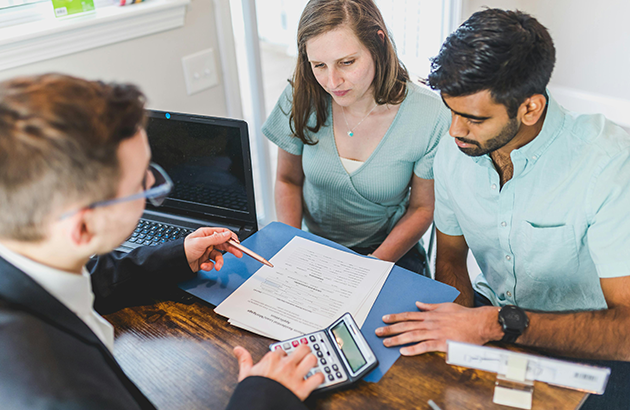As a first-time buyer, your mortgage is likely to be your biggest financial commitment, which is why it is so important to understand the different mortgage rates and fees.
In this guide, we’ll discuss what mortgage rates are, the different types of mortgages and what fees you can expect to pay as a first time buyer.
Are mortgage rates different for first-time buyers?
No, mortgage rates are usually the same for first-time buyers as they are for other buyers.
However, it is common for first-time buyers to receive added incentives and benefit from various first-time buyer schemes that are designed to help them get on the property ladder.

Mortgage rates for first time buyers
Your mortgage rate is the interest you pay on the money you borrow to buy a property and is expressed as a percentage. The higher the percentage, the more interest you will have to pay on your monthly mortgage payments.
Some factors that affect mortgage rates, including those for first time buyers, include:
-
- The Bank of England base rate
- The length of the loan term
- Inflation
- Your deposit amount
- Which deal you choose
Fixed-rate mortgages
A fixed-rate mortgage keeps your monthly repayments at a set rate for an agreed period of time, usually between 2-5 years.
Once the deal has ended, you can either remortgage or pay the current lender’s standard variable rate. With a standard variable rate, your mortgage payments could either go or up or down depending on the rate.
Discounted variable-rate mortgages
A discounted variable-rate mortgage usually lasts between 2-5 years and is fixed at a set percentage below the lender’s standard variable rate (SVR).
It’s worth bearing in mind that your mortgage rate will change when the SVR changes, but the interest you pay will always be charged at the agreed, fixed percentage.
Tracker mortgages
Tracker mortgages are based on the Bank of England’s base rate. The actual mortgage rate you pay will be a set interest rate above or below the rate tracked.
This means that the amount of interest you pay each month could go up or down depending on what the tracked rate does.
Interest-only mortgages
An interest-only mortgage is a type of loan where you only need to repay the interest charges each month, without reducing the original amount you borrowed.
This means your monthly payments will be slightly lower than a fixed-rate mortgage for example, but you must have a plan in place in order to repay the amount you borrowed at the end of the mortgage term.
As a first time buyer, it’s unlikely that an interest-only mortgage will be appropriate for you, however, a lender may offer this mortgage if you can clearly demonstrate how you will repay the capital sum at the end of the mortgage term.
Guarantor mortgage
A guarantor mortgage is a type of mortgage that uses someone else’s home as ‘security’ that the lender has the right to sell if neither the borrower or guarantor can keep up with the borrower’s mortgage payments.
What type of mortgage is best for first-time buyers?
Not every first-time buyer will be in the same financial position, so it’s difficult to say which type of mortgage is the best.
Many people think of first-time buyers as young couples, however, you can buy your first home at any point in your life. For example, a first time buyer in their 50s may be in a very different financial situation than a couple in their 20s, so it’s hard to generalise which type of mortgage would be best.
Our team at Barlow Irvin can help to find the best mortgage for you and your current financial situation. We know the home buying process is unique, which is why we always take the time to consider your individual needs and find the best product that suits you.
Speak with Our Team About Mortgage Fees
What does LTV mean?
LTV stands for ‘loan-to-value’ ratio. It is essentially a percentage that compares the amount of money you borrow to the value of the property you’re buying.
For example, if you buy a property for £180,000 with a 10% deposit of £18,000, your LTV will be 90%. The bigger your deposit, the lower your LTV will be.
LTV is a key consideration for most lenders and it will determine what type of mortgage you can get. LTV can also affect the interest rate that might be offered on your mortgage, meaning higher monthly mortgage repayments.
Fees when getting a first-time buyer mortgage
There are a few different fees that you will need to consider when getting a mortgage as a first-time buyer.
Common mortgage costs include:
-
- Product fees – The product fee covers the cost of setting up a new mortgage deal with a lender.
- Valuation fees – Your lender will value the property you’re buying to make sure it is worth the asking price. Your lender will arrange a valuation which will be added on to the total fee cost.
- Survey costs – A survey is an optional step that you may want to arrange to find any issues with your new home before you buy it. This will be conducted by a property surveyor who will look for any repairs that need to be done and any safety issues.
- Broker fees – These fees will only apply if you are using a mortgage broker to find a suitable deal. The costs of using a mortgage broker will vary, but we will discuss these costs with you beforehand so you can decide if it is right for you.
- Conveyancing – You will need to hire a solicitor to handle the legal elements of the house buying process. They will sort out the contracts, manage your deposit and carry out the sale of the property. Conveyancing fees will usually include the transfer of deeds and legal paperwork.
- Stamp Duty costs – Stamp Duty is paid to the government as a form of property tax. First time buyers in England and Northern Ireland do not have to pay Stamp Duty on the first £425,000 of a property purchase.
- Land Registry Fee – The Land Registry Fee is a charge to have the legal ownership of the house changed to your name.


